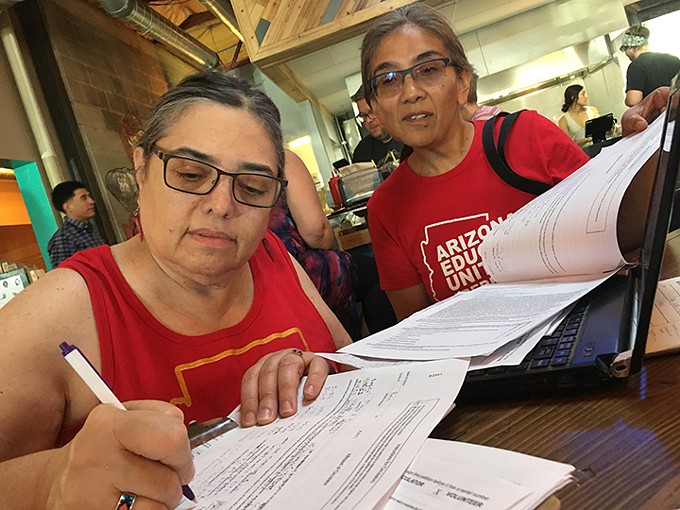Marea Jenness, a Tucson High School biology teacher, keeps a megaphone in the boot of her Mercury Mariner. With the Red for Ed movement becoming a staple these days, Jenness stays ready in the event of more protests.
Jenness is one of thousands of Southern Arizonans who support a citizen-led ballot initiative that increases tax rates on high-income earners to address underfunding in public schools. Proponents estimate the increase would raise $690 million annually. The proposal would increase taxes on individuals who earn more than $250,000 a year and couples who earn more than $500,000.
The coalition needs 150,642 valid signatures by July 5 to place the Invest in Education Act on the November ballot, but they're shooting for at least 200,000.
David Lujan, director of The Arizona Center for Economic Progress, said the group is on track to getting the signatures they need by the deadline. Invest in Education organizers hadn't released a statewide count, as of this week, of how many signatures they had gathered so far.
But if they can get enough signatures to put it before voters in November, they stand a decent chance of winning at the ballot box, according to a recent poll discussed at a June 6 INVESTinED news conference in Phoenix with the Children's Action Alliance and other education advocates. A phone poll that was conducted in late May found that 65 percent of the 646 voters polled said they support the measure.
"By in large, I've found that people are interested in signing the petition," said Wesley Oswald, a third-grade teacher at Escuela Manzo Elementary School.
Oswald spends time petitioning to hikers on Tumamoc Hill, a site that he says produces more signatures than any other location. Along with many other educators and allies, he spent the past weekend collecting signatures, citywide, with a goal of 3,000 more signatures. They reached 4,108 signatures during the weekend, according to Invest in Education organizers.
"I choose to stay here despite the fact that the pay is less than ideal," Oswald said about teaching in Arizona. "It's disheartening to know that I can move to any neighboring state and make significantly more. Teaching should be a respectable career, and we're not treated as such."
The Arizona Chamber of Commerce and Industry is adamant that the potential ballot initiative "will do more harm than good," said Chamber spokesman Garrick Taylor. They believe this initiative would create a volatile funding source for teacher raises and increased education funding.
A PEW Research analysis of national total tax revenues from fiscal 1997 to 2016 previously ranked Arizona as the eighth most volatile state in the U.S.
"In an economic downturn, you see wild fluctuations among tax brackets and the [initiative's] targeted income earners," Taylor said. "You're putting the premise of predictable funding at risk."
Understanding that education funding is a major problem, the business-advocacy group said they support Gov. Doug Ducey's 20 percent teacher pay raise proposal and trust that using current revenue sources provide a more stable financing stream than the initiative.
The coalition recognizes tax unpredictability, but Lujan, a former state lawmaker who is now with the Arizona Center for Economic Progress, said that combining Ducey's proposal with Invest in Education will mitigate such risks. Government funding has the potential to get cut every year, but dedicated revenue sources will simply change with the economic cycle.
"Gov. Ducey's plan was a good step, but it falls far short of what we need in terms of resources," Lujan said. "This will provide significantly more revenue to help us get to at least to 2008 levels."
Invest in Education organizers said the initiative is the start of many efforts to get more money into public schools from different sources.
"This isn't the only piece that we're going to need to do to move from the 40s to somewhere much nicer, in where we're ranked in education funding," Mesa High School teacher Joshua Buckley said at the INVESTinED News conference.
The Arizona Chamber is also concerned that raising taxes on higher income earners will drop the state's economic competitiveness because it "sends the wrong message to small businesses" that file their company taxes under individual owners and "entrepreneurs who are looking to Arizona as a great place for business."
Lujan has full confidence that the measure will boost the state's economy rather than hurt it. He pointed out that for several years, business groups cited the lack of a skilled workforce and inadequate investments in public education as the top two challenges to doing business in the state.
"This initiative will address those very issues by finally giving us more resources so that we can create a more skilled workforce and jobs that the Arizona economy needs," Lujan said. "The business community should be championing a skilled workforce in Arizona, which will lead to more jobs and a stronger economy."
Jason Freed, president of the Tucson Education Association and volunteer for the initiative, said business owners have been very supportive, signing the petition and suggesting volunteers set up in front of their storefronts to gather signatures.
"To say that educators and the community at-large are disappointed in the Chamber would be an understatement," Freed said in an email. "Education is the number one issue facing Arizona and has been underfunded for decades. Currently, education funding is $700 million behind where we were in 2008, which is what the INVESTinED initiative will bring back into our classrooms and schools once passed."
The Arizona State Legislature passed a budget proposal at the end of April, after nearly a week of statewide teacher walkouts, granting teachers a 19 percent raise over the next three years. But teachers had demands that were not met in the new state budget.
The Red for Ed movement did not secure raises for all educational support staff or the complete $1.1 billion to bring education funding back to pre-recession levels. Rather, the budget included an extra $371 million yearly, over five years, for school funding and any support staff raises.
Freed says the initiative will help repair crumbling school infrastructure, fund all-day kindergarten, improve outdated computers and materials, and make the state more competitive—all of which will go a long way toward addressing the teacher shortage.
Taylor, Arizona Chamber of Commerce spokesman, said despite their disagreements with the coalition's ballot initiative, they want everyone to find a joint solution.
"The business community and the education community and parents and elected leaders should continue to get together to write policies that address this issue," he said.
But frustrated educators say they chose to take matters into their own hands after years of watching legislators cut taxes while education funding trails nearly every other state.
"I feel like teachers have to do it ourselves," Jenness said. "I [continue to] spend hundreds of dollars on my classroom every year."
Tori Tom is a University of Arizona journalism student and a Tucson Weekly intern.











